Term Page
Enforcement
Permanent residents have many rights and benefits.
Permission to live and work in the United States
Eligibility for certain public benefits
Right to travel within the United States and abroad
Your green card is proof of your status. If you lose it or it expires, you are still a permanent resident. Permanent Residence is a status—only an immigration judge can take away your permanent residence. Permanent residents should carry their green card (or at a minimum a copy of it).
Permission to live and work in the United States
Eligibility for certain public benefits
Right to travel within the United States and abroad
Your green card is proof of your status. If you lose it or it expires, you are still a permanent resident. Permanent Residence is a status—only an immigration judge can take away your permanent residence. Permanent residents should carry their green card (or at a minimum a copy of it).
The Trump administration’s Registration requirement for most undocumented immigrants is another hateful tactic in its campaign to cause panic and fear throughout the country. The Department of Homeland Security (DHS) has been clear that the central purpose of Registration is to gather information about all noncitizens and use this information to locate, apprehend and remove them as quickly as possible. The new registration requirement took effect April 11, 2025.
The Trump Administration is rapidly expanding the 287(g) immigration enforcement program. This program worsens police discrimination and increases the risk of arrest, detention, and deportation for immigrants living in or traveling in places that participate in the 287(g) program.
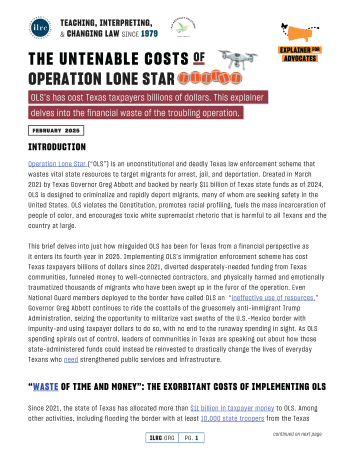
Operation Lone Star (OLS) is an unconstitutional and deadly Texas law enforcement scheme that wastes vital state resources to target migrants for arrest, jail, and deportation. To date, nearly $11 billion has been spent on OLS. This policy brief delves into how misguided OLS has been for Texans from a financial perspective and provides recommendations for how OLS funds could be reinvested to support the everyday lives of Texans who need strengthened public services and infrastructure.
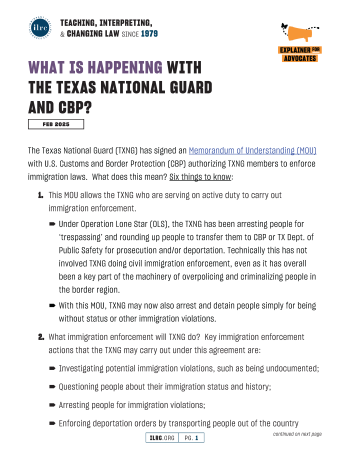
CBP has signed an agreement delegating immigration enforcement authority to the Texas National Guard. Under the President's "mass influx" declaration, local and state law enforcement agencies may take on civil immigration enforcement authority that they wouldn't otherwise have. These specific powers are designated in a Memorandum of Understanding signed with CBP. This quick explainer highlights what this MOU says, what this means for Texas, and how it relates to Operation Lone Star.
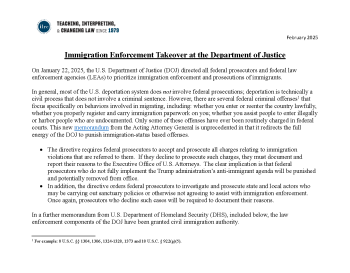
Following the new administration’s dramatic reorientation of all federal agencies into immigration enforcers, on January 21st, 2025, the DOJ issued a directive requiring all federal prosecutors to prioritize immigration prosecutions. The memorandum also threatens prosecutions and civil lawsuits to sanctuary jurisdictions and entities that seek to protect immigrants. In this analysis, we explain the different sections of the DOJ’s memo and what they mean for immigrants and federal courts nationwide.
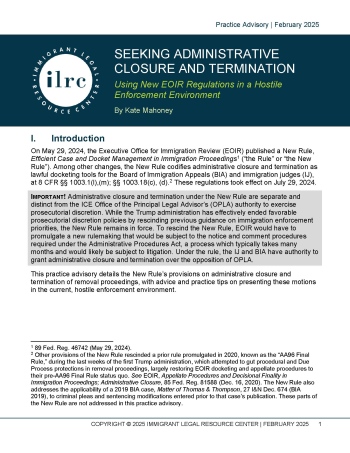
New EOIR regulations published in 2024 now allow immigration judges and the BIA to administratively close or terminate removal proceedings in a variety of scenarios. These regulations permit—and sometimes require—administrative closure or termination even where the Department of Homeland Security does not agree. In the current hostile enforcement environment, and in light of the rescission of formal guidance regarding prosecutorial discretion, these regulations are an important tool for advocates seeking to get clients out of removal proceedings.

Since Donald Trump was re-elected, headlines on immigration have sounded the alarm about his administration’s plans to effectuate mass deportations, increased detentions, and indiscriminate raids. For the past three years, Governor Greg Abbott has used Texas as a laboratory for these types of policies through Operation Lone Star (OLS). This resource aims to parallel the national moves on enforcement to what has already taken place in Texas, in hopes to better equip community members and advocates with the framework to fight back.
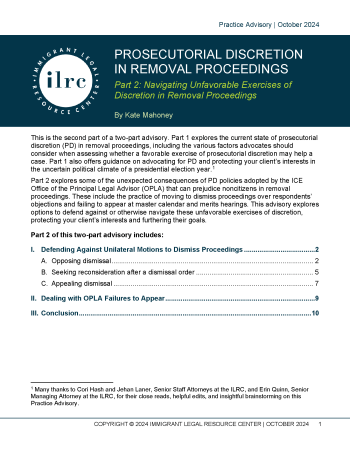
Part 2 of this 2-part advisory explores some of the unexpected consequences of PD policies adopted by the ICE Office of the Principal Legal Advisor (OPLA) that can prejudice noncitizens in removal proceedings, including the practice of moving to dismiss proceedings over respondents’ objections and failing to appear at hearings.